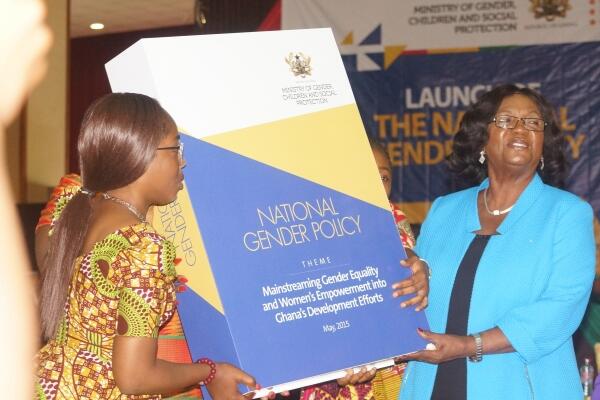The people of Ghana had expressed a sigh of relief when the National Gender Policy was launched on Monday the 14th of December 2015 at the Banquet Hall of the State House in Accra. Prof Ekua Kuenyehia who chaired the function said “there had been many attempts to develop national policies for women and children but the process normally does not go far. Until Ghana assimilates women and other vulnerable groups for their development, the country will remain stagnant she said”. According to her, when you take the population of Ghana, women are in the lead “No nation can develop on one leg” she emphasized. She observed that the challenges being faced in the progression of gender issues are competing government priorities, political will, as well as poverty that has the face of a woman. She, however, observed that this is not only in Ghana but a global issue. She expressed the hope for a new era in Ghana where gender equality will be taken seriously. She recounted Ghana’s journey towards gender equality and empowerment of women which started from the establishment of National Women’s Machinery; the National Council on Women and Development to the Ministry of Women and Children’s Affairs and, currently the Ministry of Gender, Children and Social Protection.
The Minister for Gender, Children and Social Protection Nana Oye Lithur in her opening statement acknowledged the work of her predecessors for providing quality leadership in championing the cause of women in Ghana and more importantly in the development process of this current policy. She outlined the gender agenda for her Ministry as the following: pushing for the passage of the affirmative action bill; ensuring effective mainstreaming of gender together with the enforcement of the intestate succession law, among others. The Minister acknowledged that the Ministry could not do all that was required by itself and encouraged everyone to become familiar with the policy and take up implementation of sections that affect them. She concluded by saying that “it is our belief as government that continuing to reduce poverty levels, improving health and living standard in Ghana is contingent upon the formulation of effective policies that promote gender equality, equity and empowerment of women at all levels and sectors”.
UNFPA Representative, Babatunde Ahonsi reiterated that backed by strong historical and contemporary evidence, UNFPA has always emphasized that gender equality and women’s empowerment are critical for positive development outcomes related to health, education, social and economic rights fulfillment, good governance and economic growth. He said UNFPA supported the policy right from the development stage to its launch because it will ensure an evidence-based planning and governance system where human, social, financial and technological resources are efficiently and effectively deployed for sustainable development. He pointed out that promoting gender equality is now globally accepted as a proven development strategy. According to Dr Ahonsi, the attainment of gender equality is not only seen as an end in itself and as a human rights issue, but as a pre-requisite for poverty reduction, enhanced efficiency in public investments, and good family health at low cost, amongst several other positive impacts.
The Guest of Honour for the event, Her Ladyship Justice Georgina Theodora Wood was full of praise for the Ministry and stated that the Judiciary is committed to ensuring that as an institution, all its undertakings including the selection of Judges and staff of the Judicial Service take into consideration gender equality issues. She declared that she stands committed to the goal of investing in women because it is the smart thing to do. She urged each and every one to play a role in ensuring the success of the implementation of the policy.
To usher in the policy, men, women and children present, danced to celebrate the launch of the new policy document.


